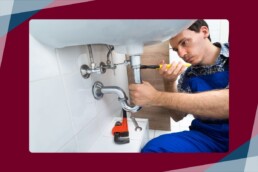The Small Business Owner’s Guide to Plumber Insurance
On average, every person in the US uses 100 gallons of water a day, and ensuring this passes safely through our homes and workplaces is vital. Because of this, the demand for plumbing businesses across the country is extremely high.
In fact, there are currently more than 122,000 plumbing businesses working across the United States. However, you can’t just rely on plumbing demand to keep your business afloat.
Accidents and damage in the workplace could cost you some serious money. This is why most businesses invest in plumber insurance for financial security.
So what is plumber insurance and why should you get it for your plumbing business? Read our guide to plumber insurance policies to find out more!
What is Plumber Insurance?
Plumber insurance, like other types of insurances, is a sort of financial protection that you can take out for your business. This involves paying a monthly or annual premium.
In exchange for this premium, you are protected against the cost of any damage that might occur during one of your plumbing jobs.
For example, let’s say you cause unintentional damage to one of your client’s homes. Your insurance will cover the cost of repairing this and can provide financial support if your client tries to sue you.
Generally, this covers costs that would be too much for you to handle on your own.
What Does Plumber Insurance Cover?
There are lots of different plumbing insurance packages available. It is a good idea to get one that offers extensive coverage. This should include:
General Liability Coverage
This covers the cost of any damage to property while you are working. It also covers you against any injuries that might take place in your workplace. This means you have financial protection if someone wants to make a personal injury claim against you.
Property Coverage
This protects the tools of your trade. If they are stolen or accidentally damaged, your insurance will help you replace them.
Income Loss Coverage
Delays and work stoppages can be very expensive during a project and are often out of your control. Income loss coverage will cover the cost of any lost income if this does happen to you.
It is also a good idea to look for coverage for the following:
- Damages that you or your employees might cause, such as water leaks or work delays.
- Damage caused to existing pipes during your projects.
- Gas explosions caused by you or your employees’ work.
These scenarios could cost you a lot, so getting insured against them is essential. Some of this coverage might increase the cost of your premiums. However, if something goes wrong, you’ll be thankful you have it!
How Much Does Insurance for a Plumbing Business Cost?
The cost of plumbers’ insurance depends a little on how much you want to get insured for. Being insured for more will raise the cost of your premiums.
Generally, monthly premium prices range from between $27 and $49. This usually provides general liability insurance coverage of between $1,000,000 and $2,000,000. This might sound like a lot of coverage, but a workplace accident claim can be very expensive.
A few things can affect the price of your premiums including:
- The size of your company
- The number of employees you have working for you
- The amount of training and experience you and your employees have
You can also lower the cost of your monthly premiums by signing up to pay a high voluntary excess. This means that if you do make a claim, you will cover a portion of the cost of the damages before your insurer pays out.
This can be a great way to save a little money on your premiums. However, it is important that you are financially stable enough to cover the excess cost if you do have to make a claim.
Additional Insurance Policies to Consider for Your Plumbing Business
On top of your basic plumbing business insurance, you may also want to sign up for more general business coverage. Signing up for these policies will give you more comprehensive coverage.
Commercial Auto Insurance
Most plumbing businesses, no matter their size, require transportation. So you may have a number of business cars, trucks, or vans.
Commercial auto insurance will cover these to be driven by a number of your employees. It also covers the loss or theft of these vehicles so that you can replace them easily.
Worker’s Compensation Insurance
Worker’s compensation insurance is a must-have for any employer. This covers you if an employee tries to make a claim for an accident at work or sick-pay. This insurance will help you to cover the cost of their medical bills, loss of earnings, and compensation.
Worker’s compensation insurance operates separately from general liability insurance. It is a requirement for most American employers.
Additional Equipment Insurance
Some more advanced equipment and machinery won’t be covered in your basic insurance package. Often this equipment is extremely expensive to fix or replace. So it is worth discussing this with your insurance agent, to make sure all of your equipment is covered by your policy.
If you sign up for multiple insurance packages at a time, you may also get a better deal on your overall premiums. So it is a good idea to consider all the coverage that you’ll need before signing up for a policy.
Find the Perfect Plumber Insurance Coverage for Your Business!
When it comes to protecting your plumbing business, investing in plumber insurance is an absolute must. This small monthly or annual cost will provide protection if things go wrong and it could save your business from financial ruin!
So what are you waiting for? For more help on how to find the right plumber insurance policy for your business, get in touch today.
Related Articles
Homeowners Insurance in NJ: A Comprehensive Guide
Key Takeaways Homeowners insurance in NJ protects your home, personal property, and liability, making it essential for safeguarding your investment. Annual…
What You Need to Know About Flood Insurance in NJ
Key Takeaways Flood insurance is essential for New Jersey homeowners, even those outside high-risk zones, as flooding can occur anywhere from various sources…


